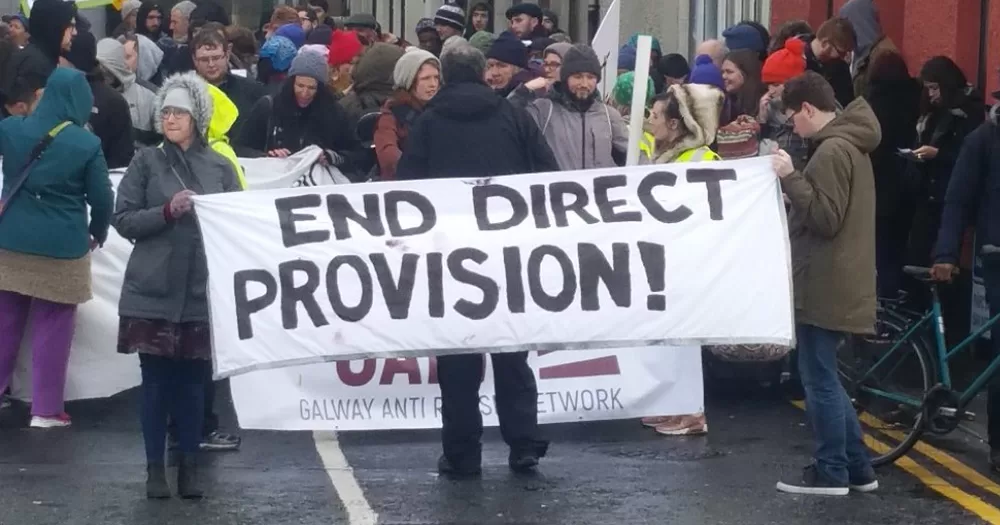A new report from LGBT Ireland has demonstrated that Direct Provision centres in Ireland are failing to protect LGBTQ+ residents from homophobia and transphobia. The document, entitled ‘LGBTI+ people living in International Protection Accommodation Services (IPAS) accommodation: Best practices & lived experiences’, was commissioned by the Department of Children, Equality, Disability, Integration and Youth, and published on Tuesday, September 12.
The project was managed by Collette O’Regan and Mariem Ben Chattouh of LGBT Ireland who were accompanied by a research team consisting of Dr Chris Noone, Dr Noemi Magugliani and Rory Sugrue. Its aim was to develop recommendations for the government in order to improve the support of international protection applicants who are members of the LGBTQ+ community.
A total of 12 adults who have lived in Direct Provision within the last two years and recognise themselves as having a minoritised sexual and/or gender identity contributed to the report. The participants shared their experiences in response to different prompts, with various quotes included in the publication.
Speaking about the oppressive environment in the centres, one person said, “You left your country where you are facing that, and you came in a new country where LGBT is accepted, but then you are being put into a place where you are back to where you were in [country of origin], like everybody looking at me, like you know: ‘ok he’s gay’. Like the ‘f’ word this kind of stuff.”
Another revealed, “My experience was traumatic as 99% of the other residents were conservative and homophobic.”
One participant stated, “I’m very grateful I have a roof on top of my head and been fed. But it’s very scary […] living in direct provision was more scary than sneaking into the country.” Someone else added, “This is the key thing; it’s called International Protection. We need to feel safe.”
Minister @rodericogorman launched a report yesterday, which sets out new recommendations to support members of the LGBTI+ community living in International Protection accommodation.
? Read full press release here; https://t.co/G6BDYAbOFs#LGBTIreland #LGBTSupport? pic.twitter.com/34PNLbf99N
— Children, Equality, Disability, Integration, Youth (@dcediy) September 13, 2023
Multiple people reported going back into the closet when entering Direct Provision and isolating themselves: “I felt very unsafe and scared, I had to hide my sexuality. It’s not safe, it’s not a safe place for me, a lot of people, so I start to be more isolated.”
“I feel like depression, I feel like people try to ignore me, or feel like isolated, making me depressed […]. So I don’t have friends, that’s it. I don’t have friends.
The participants also criticised the lack of support for LGBTQ+ people in Direct Provision, as well as the management style and complaints procedure.
“They don’t care what you’re going through, they don’t care, trust me. I know they provided me shelter, but they don’t care. Once they put you in a centre, whatever is happening with you, maybe you are going through depression, they don’t care,” one respondent said.
In light of the findings, the report includes a total of 13 recommendations for consideration which relate to specific health supports for trans and non-binary people, respect for privacy, communications and standards aimed at eliminating anti-LGBTQ+ discrimination, training for relevant staff, and the process for making complaints for those who experience homophobia or transphobia.
Commenting on the report, Collette O’ Regan Senior Training & Advocacy Manager with LGBT Ireland, said, “The research findings clearly evidence that right now, and for so many years, LGBTQ+ residents of IPAS accommodation, the International Protection Accommodation Service, do not feel safe, talk less of feeling protected.
“LGBT Ireland looks forward to working urgently and intensively with the Head of IPAS, David Delaney, and his colleagues in key positions such as training to IPAS centre managers and centre manager relations management, to quickly start the work of transitioning the now homophobic/transphobic centres and emergency hotels into places where LGBTQ+ residents see clear information on who and how to report incidents as well as perpetrators of homophobic/transphobic bullying, harassment, violence feeling immediate consequences for their words and actions.”
To read the report on LGBTQ+ people living in Direct Provision, click here.
© 2023 GCN (Gay Community News). All rights reserved.
Support GCN
GCN is a free, vital resource for Ireland’s LGBTQ+ community since 1988.
GCN is a trading name of National LGBT Federation CLG, a registered charity - Charity Number: 20034580.
GCN relies on the generous support of the community and allies to sustain the crucial work that we do. Producing GCN is costly, and, in an industry which has been hugely impacted by rising costs, we need your support to help sustain and grow this vital resource.
Supporting GCN for as little as €1.99 per month will help us continue our work as Ireland’s free, independent LGBTQ+ media.

comments. Please sign in to comment.